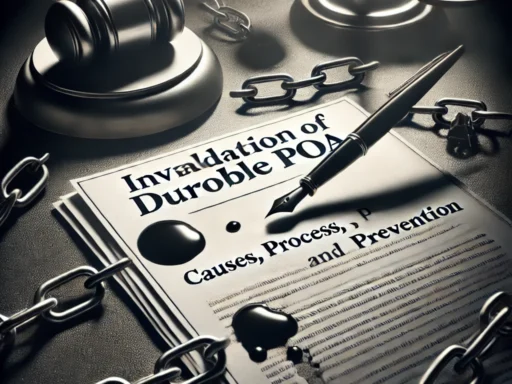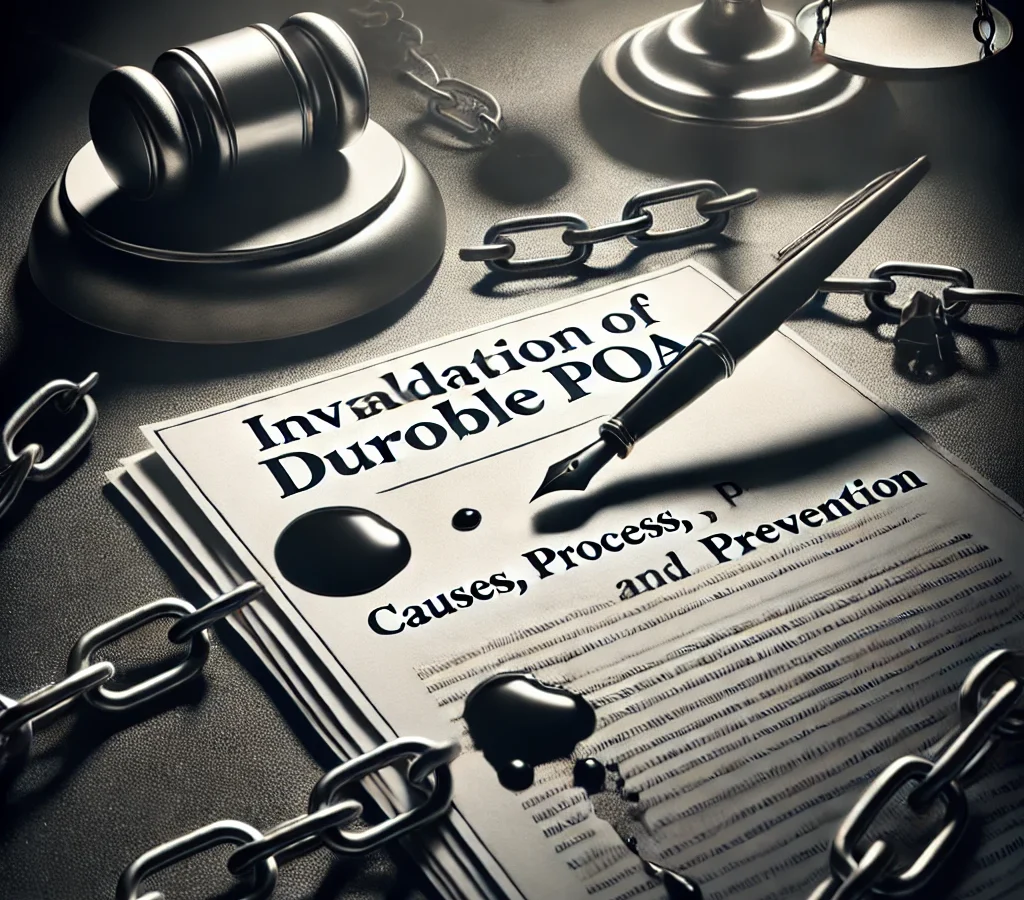Ever wondered about the durability of a Power of Attorney (POA) and whether it can be invalidated? I’ve delved into the legal intricacies of POAs, specifically focusing on their durability and under what circumstances they can be invalidated.
In the labyrinth of legal terminology, a durable POA stands out as a powerful tool. But like any tool, there are instances where it may not hold its ground. I’ll shed light on these situations, providing a clear understanding of the conditions that can render a durable POA invalid.
Join me as we navigate the complexities of this legal document, breaking down its vulnerabilities and strengths. This article aims to empower you with knowledge, making you better equipped to handle your legal affairs.
Understanding POA
Gaining a grasp on the concept of Power of Attorney (POA) forms a crucial part of managing any legal obligations effectively. Let’s delve deeper into what POA is and its different kinds as well as what sets a durable POA apart.
Basic Definition of Power of Attorney (POA)
A Power of Attorney (POA) is a legal document. This document authorizes an individual, referred to as the ‘agent,’ to handle essential tasks on behalf of another, termed the ‘principal’. These tasks can include financial affairs, healthcare decisions, or property management. For example, an elder person might instate a POA authorizing their child to manage their financial affairs.
The Different Types of POA
There are varying types of POA, and understanding them can be essential to their successful use. Major types include General, Limited, Healthcare, and Durable. A General POA grants broad powers to the agent, while a Limited POA restricts these to specific situations or transactions. On the other hand, Healthcare POA focuses on healthcare decisions. In contrast, a Durable POA remains effective even if the principal becomes incapacitated, essentially overcoming the constraint that POAs are no longer valid if the Principal becomes mentally incapacitated.
What Makes a POA Durable
The defining characteristic of a durable POA is its durability—that is, its continuation despite the principal’s incapacitation. This set feature separates it from other types of POAs that become null upon the principal’s incapacitation. In other words, a durable POA stays in effect regardless of the principal’s mental competence, allowing the agent to continue making decisions on their behalf. For instance, a durable POA might keep functioning even if the principal falls into a coma, providing an uninterrupted decision-making process.
Can A Durable POA Be Invalidated
Indeed, a durable POA’s validity isn’t absolute; instances occur where it may become invalid. Further discussion of these instances falls under the following subheadings:
Conditions for Invalidation of a Durable POA
A durable POA can indeed turn invalid under certain conditions. These conditions primarily revolve around the elements of legality and capacity. Below, I dissect these conditions.
- Principal’s Revocation: If the principal decides to withdraw the power given to the agent and communicates this decision, the POA loses its validity immediately.
- Principal’s Incapacity or Death: Contrary to common misconceptions, a durable POA does cease in case of the principal’s death. In other words, death of the principal automatically invalidates the durable POA.
- Agent’s Inability or Unwillingness to Act: If the chosen agent is unable or unwilling to perform the duties assigned, the durable POA can become invalidated. It’s, therefore, paramount for the principal to select an agent they can rely on.
- Invalid Formation: If the POA lacks proper execution – that is, if it’s not signed, witnessed, or notarized as required by state law, the durable POA is invalid from the inception.
Always remember, these conditions vary from one jurisdiction to another, with each laying down specific laws on durable POA. For an accurate interpretation of laws on durable POA in your location, consult with a legal expert.
The Legal Process of Invalidating a Durable POA
Invalidating a Durable Power of Attorney (POA) involves a legal process. The associated complexities mandate a comprehensive understanding of the principles governing the procedure.
Initiating the Process for Invalidation
Invalidating a Durable POA commences with launching a formal legal process. To trigger this, a petition must first be prepared, detailing the intent and the reasons for revocation. Following this, the petition must then be submitted in a court of law. Importantly, the petitioner — the one intending to invalidate the POA — bears the burden of proof.
For example, if the petitioner believes the principal lacked mental capacity at the time of signing the document, medical records, expert testimony from doctors, or affidavits from family members and friends can be used as evidence.
Who Can Petition for Invalidation
Generally, any party with a legitimate interest in the welfare of the principal can file a petition to invalidate a Durable POA. This typically includes close relatives like children, siblings, or spouses but can also extend to other parties.
For instance, medical facilities or health care providers directly involved in the principal’s care may seek invalidation if they think the agent is making decisions that aren’t in the best interest of the principal. Similarly, financial institutions might petition if they suspect fraudulent activity.
Ultimately, it’s up to the courts to evaluate the evidence and decide whether the durable POA should be invalidated or not. It’s essential to consult with a legal professional to guide through this complex procedure, taking into account the specific laws applicable in your jurisdiction.
Effects of Invalidating a Durable POA
When a durable POA gets invalidated, the ripple effects manifest differently for various entities. This extends to the principal, the attorney-in-fact, and third parties.
Effects on the Principal
Upon invalidation of the durable POA, the principal regains control over their affairs. It means that they’re back in charge of managing their financial transactions, making health care decisions, and dealing with property matters. In cases where the principal lacks mental capacity, a court-appointed guardian or conservator typically steps in to ensure their needs get addressed promptly. On the negative side, this shift could lead to disruption and delays as the new party familiarizes themselves with the principal’s preferences and situations.
Effects on the Attorney-in-Fact
The consequences for the attorney-in-fact, also known as the agent, are straightforward. They lose the legal authority to act on behalf of the principal. This implies that they can no longer access the principal’s funds, make healthcare decisions, or handle other crucial tasks as stipulated in the POA. Additionally, they risk legal repercussions if they continue to act beyond this point without adequate authorization.
Effects on Third Parties
Third parties who interact with the attorney-in-fact based on the durable POA could also face implications. This primarily involves parties like banks, healthcare providers, and legal agents. For instance, banks that allow the agent to continue accessing the principal’s account after the invalidation could face legal liabilities. Hence, these entities must enact due diligence to verify the validity of the POA before executing any related transactions. They also bear the responsibility to stop interactions with the agent upon receiving a revocation notification or if they become aware of the principal’s death, incapacity, or any condition that invalidates the POA.
Preventing Invalidation of a Durable POA
Legal precautions help keep a durable POA from being invalidated. In this endeavor, it’s crucial to identify the potential areas that could lead to invalidation and strategize to fortify your durable POA against such instances.
Identifying Potential Areas That Could Lead to Invalidation
Key areas can trigger invalidation. One focal point has to be the principal’s mental capacity during the formation of the POA. A principal lacking clarity of mind, possibly due to mental illness or dementia, at the time of establishing the POA may render it invalid. For instance, in a court of law, medical evidence might be used to establish that a principal was incapable of understanding the terms and impacts of their POA when it was formed, leading to its nullification.
An irregularity during the formation or execution could also initiate an invalidation. The document must adhere to the stipulated legal requirements for it to hold. For example, in many jurisdictions, a durable POA necessitates notarization and the presence of two or more witnesses.
Lack of agent performance is another factor. If an agent fails or refuses to carry out the obligations outlined in a POA, or if they act beyond their stipulated authority, it might result in the POA’s invalidation.
Ways to Fortify Your Durable POA against Invalidation
Taking measures to strengthen your durable POA against invalidation includes addressing the vulnerabilities I’ve mentioned.
To begin with, ensure the mental soundness of the principal during the creation of the POA. This could mean scheduling a mental health assessment close to the time of formation. Ensuring the principal comprehends the decisions they are making can prove immeasurably beneficial if a dispute arises down the line.
Ensuring compliance with all legal requirements during the formation and execution is vital. A lawyer could review the terms, help ensure it adheres to local regulations, and confirm its execution adheres to all legal requirements — such as the proper notarization and witnessing.
Lastly, careful selection, instruction, and monitoring of the agent can help prevent an invalidation arising from performance issues. The nominated agent should be a trusted individual endowed with a clear understanding of their responsibilities and the implications of their role. Regular monitoring of the agent’s actions can also highlight any potential issues early on, preventing deeper legal repercussions.
Expert Tips on Durable POA and Invalidation
Validating a Durable POA proves crucial, particularly to preclude potential conflicts. I’ll provide definite and concise steps to help fortify the durability of this significant legal instrument.
Mental Soundness of Principal
The mental capacity of the principal at the time of the Durable POA’s creation may serve as grounds for invalidation. Instances of this include diseases like Alzheimer’s or any other condition that affects cognitive function. For instance, to fortify against this risk, ensure verification of the principal’s mental soundness, preferably through certified medical professionals.
Execution Regularities
Faltering in any legal formalities during the Durable POA’s creation could render it invalid. Irregularities include but aren’t limited to, the absence of required witnesses, signature issues, and not meeting the state’s specific requirements during the document’s formation. It’s prudent to engage a professional legal expert to help avoid these issues.
Agent Performance
The agent’s performance often trips off disagreements, potentially leading to invalidation. Cases of conflict arise when the agent doesn’t act in the principal’s best interest, mismanages their assets, or exploits the authority granted. Selecting a trustworthy and capable agent, therefore, proves key to averting such threats.
Lastly, regular monitoring of the agent’s activities helps ensure they’re adhering to the obligations dictated by the Durable POA. Also, it may prove beneficial to appoint a secondary agent as a failsafe measure. These steps are fundamental to the lasting validity of the Durable POA.
Though it’s possible to invalidate a Durable POA, preventive actions can significantly minimize this risk. It ultimately boils down to maintaining the principal’s sound mental health, conforming to proper legal formalities, and actively managing the agent’s role.
Discover the Power of BlueNotary:
Integrate your Business, Title Company, or Law Firm to Satisfy your Customers and Decrease Turnaround
Get a document Notarized/Sign-up
Join the Free Notary Training Facebook Group
Conclusion
So, it’s clear that while a durable POA is designed to withstand the test of time and incapacity, it’s not invincible. There are circumstances where it can be invalidated, like revocation by the principal, death, or improper execution. But remember, invalidation isn’t a simple process. It requires a formal petition and substantial proof. That’s why it’s crucial to get legal advice if you’re considering this step.
On the flip side, there are ways to bulletproof your durable POA. Ensuring the principal’s mental soundness at creation, adhering to legal requirements, and selecting a reliable agent can go a long way in preserving its validity. Regular oversight and appointing a secondary agent can also be beneficial. By taking these steps, you’re not only strengthening the POA but also protecting the principal’s interests. Remember, a durable POA is a powerful tool, but like any tool, its effectiveness depends largely on how well it’s crafted and maintained.
FAQs
What is a Durable Power of Attorney (POA)?
A Durable Power of Attorney (POA) is a legal document that grants an agent authority to make decisions on behalf of the principal. What makes it “durable” is that it remains valid even if the principal becomes incapacitated. It allows the agent to continue handling affairs such as financial matters or healthcare decisions when the principal is no longer able to do so themselves.
How can I revoke a Durable POA?
A principal can revoke a Durable POA by notifying the agent and any relevant third parties (such as financial institutions) in writing. It’s also advisable to notarize the revocation for added legal protection. Services like BlueNotary make it easy to notarize such documents online, ensuring the revocation is legally binding and properly executed.
What should I do if I suspect a Durable POA is being misused?
If you believe an agent is misusing their authority under a Durable POA, you can:
- Petition the court to revoke or invalidate the POA, providing evidence of misconduct.
- Notify authorities, especially if financial abuse or exploitation is suspected.
- Involve a lawyer who specializes in POA disputes for further legal action. Courts will assess the evidence and may appoint a new guardian or conservator for the principal.
How can I prevent my Durable POA from being invalidated?
To prevent the invalidation of a Durable POA, ensure that:
- The principal is mentally sound when creating the POA, ideally verified through medical documentation.
- The POA is properly executed following state-specific laws, which typically include signatures, witnesses, and notarization. Using services like BlueNotary can help ensure all legal requirements are met for a valid POA.
- You select a trustworthy agent and regularly review their performance, adding a secondary agent if necessary for additional security.
What happens if a Durable POA is invalidated?
If a Durable POA is invalidated, the agent loses their legal authority to act on the principal’s behalf. The court may appoint a guardian or conservator to manage the principal’s affairs. This could cause delays in decision-making and disruptions in the principal’s financial or healthcare management, which is why maintaining a valid, well-drafted POA is essential.








